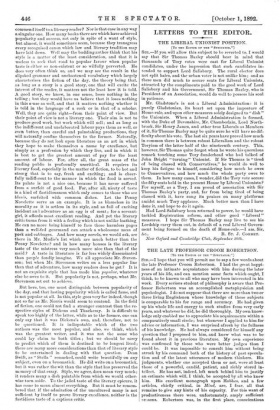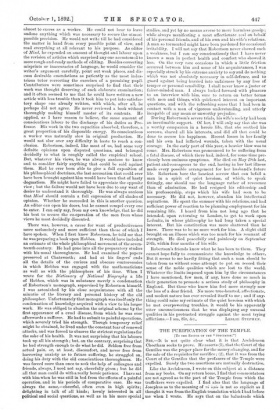THE LATE PROFESSOR CROOM ROBERTSON. [To THE EDITOR OF THE
"SPECTATOR."] SIE,-I hope that you will permit me to say a few words about the late Professor Croom Robertson. I had the great happi- ness of an intimate acquaintance with him during the later years of his life, and can mention some facts which ought, I think, to be known to all who may have been interested in his work. Every serious student of philosophy is aware that Pro- fessor Robertson was an accomplished metaphysician and psychologist. I do not suppose that there are more than two or three living Englishmen whose knowledge of those subject& is comparable to his for range and accuracy. He had given up his whole life and energy to such studies from very early years, and whatever he did, he did thoroughly. My own know- ledge only enabled me to appreciate his acquirements within a comparatively small circle ; but whenever I applied to him for advice or information, I was surprised afresh by the fullness of his knowledge. He had always considered for himself any question that I proposed to him, and knew what was to be- found about it in previous literature. My own experience- was confirmed by those who were better judges than I could be. It was impossible to consult him without being struck by his command both of the history of past specula- tion and of the latest utterances of modern thinkers. His judgments, whether one accepted them or not, were at least those of a powerful, candid, patient, and richly stored in- tellect. He has not, indeed, left much behind him to justify an estimate which will, I think, be accepted by all who knew him. His excellent monograph upon Hobbes, and a few articles, chiefly critical, in Mind, are, I fear, all that remains to give any hints of his capacity. For this want of productiveness there were, unfortunately, amply sufficient e mons. Robertson was, in the first place, conscientious
almost to excess as a worker. He could not bear to leave undone anything which was necessary to secure the utmost possible precision. He would not write till he had considered the matter in hand from every possible point of view, and read everything at all relevant to his purpose. As editor of Mind, he expended an amount of thought and labour upon the revision of articles which surprised any one accustomed to more rough-and-ready methods of editing. Besides correcting misprints or inaccuracies of language, he would consider the writer's argument carefully, point out weak places, and dis- cuss desirable emendations as patiently as the most indus- trious tutor correcting the exercises of a promising pupil. Contributors were sometimes surprised to find that their work was thought deserving of such elaborate examination ; and it often seemed to me that he could have written a new article with less trouble than it took him to put into satisfac- tory shape one already written, with which, after all, he perhaps did not agree. He never reviewed a book without thoroughly making himself master of its contents. He applied, as I have reason to believe, the same amount of conscientious labour to the discharge of his duties as Pro- fessor. His work in the two capacities absorbed, therefore, a great proportion of his disposable energy. So conscientious a worker was naturally slow in original production. He would not slur over any difficulty in baste to reach a con- -elusion. Robertson, indeed, like most of us, had some very definite opinions upon disputed questions, and belonged decidedly to what is roughly called the empirical school. But, whatever his views, he was always anxious to know and to consider fairly anything that could be said against -them. Had he ever been able to give a full exposition of his philosophical doctrines, the last accusation that could ever have been brought against him would have been that of hasty dogmatism. He might have failed to appreciate the opposite view ; bat the failure would not have been due to any want of desire to understand it thoroughly. He was always anxious that Mind should contain a full expression of all shades of opinion. Whether he succeeded in this is another question. An editor can open his doors, but he cannot compel every one to enter. I can only say, from my own knowledge, that he did his best to secure the co-operation of the men from whose -views he most decidedly dissented.
There was, however, a cause for want of productiveness more melancholy and more sufficient than those of which I have spoken. When I first knew Robertson, he told me that he was preparing a book upon Hobbes. It would have included an estimate of the whole philosophical movement of the seven- teenth century. He had gone into all the preparatory studies with his usual thoroughness. He had examined the papers preserved at Chatsworth ; and had at his fingers' ends all the details of the curious and obscure controversies in which Hobbes was engaged with the mathematicians as well as with the philosophers of his time. When I wrote for the Dictionary of National Biography a life -of Hobbes, which was in substance merely a condensation of Robertson's monograph, supervised by Robertson himself, I was astonished by his close acquaintance with all the minutiae of the literary and personal history of the old philosopher. Unfortunately that monograph was itself only the condensation of knowledge acquired with a view to his larger work. He was obliged to abandon the original scheme by the -first appearance of a cruel disease, from which he was ever afterwards a sufferer. He had to submit to painful operations, which severely tried his strength. Though temporary relief might be obtained, he lived under the constant fear of renewed attacks, and was forced to observe the strictest regulations for the sake of his health. It was not surprising that his labours took up all his strength ; but, on the contrary, surprising that he bad strength enough to do what he did. Seldom free from actual pain, or, at least, discomfort, and never free from harrowing anxiety as to future suffering, he struggled on, doing his duty with the old conscientious thoroughness. He was forced more than once to seek the help of colleagues and -friends, always, I need not say, cheerfully given ; but he did all that man could do with a really heroic patience. I have sat with him when he was still in bed from the effects of a painful operation, and in his periods of comparative ease. He was always the same,—cheerful, often even in high spirits ; delighting in talk of all kinds ; keenly interested in all political and social questions, as well as in his more special
studies, and yet by no means averse to mere harmless gossip ; while always manifesting a most affectionate zeal on behalf of his personal friends, and of his own and his wife's relations. A man so tormented might have been pardoned for occasional irritability. I will not say that Robertson never showed such a weakness, but I can say conscientiously that I have never known a man in perfect health and comfort who showed it less. On the very rare occasions in which a little friction occurred between him and some of his acquaintances, I was especially struck by his extreme anxiety to say and do nothing which was not absolutely necessary in self-defence, and to guard against being hurried into unfairness by any loss of temper or personal sensibility. I shall never know a juster or fairer-minded man. I always looked forward with pleasure to an interview with him, sure to return on better terms with men and things, with quickened interest on important questions, and with the refreshing sense that I had been in contact with a man of vigorous understanding, and utterly incapable of any mean or unworthy prejudice.
During Robertson's severe trials, his wife's society had been an inestimable support. Of her, I will only say that she was a worthy companion in a heroic life, that she soothed his sorrows, shared all his interests, and did all that could be done to secure his happiness. Recent losses in her family and his own had inflicted wounds, taken with the usual courage. In the early part of this year, a heavier blow was to come. Mrs. Robertson was pronounced to be suffering from a fatal disease, of which there had, indeed, for some time pre- viously been ominous symptoms. She died on May 29th last, patient and courageous to the end, having in her last illness made every possible arrangement for her husband's future life. Robertson bore the heaviest sorrow that can befall a man in a spirit of quiet heroism, of which, to speak fittingly, one should use the language rather of reverence than of admiration. He had resigned his editorship and his professorship, steps which his wife had seen to be necessary. He did not, however, abandon his intellectual aspirations. He spent the summer with his relations, and had sufficient power of reaction to be planning employment for his remaining life. I heard from him not long ago that be intended, upon returning to London, to get to work upon Leibnitz, in whose philosophy he had long taken a special interest. But his constitution was more shattered than he knew. There was to be no more work for him. A slight chill brought on an illness which was too much for his remnant of strength. He died peacefully and painlessly on September 20th, within four months of his wife.
Robertson's friends know what be has been to them. They cannot hope fully to communicate the knowledge to others. But it seems to me hardly fitting that such a man should be taken from us without some attempt to put on record their sense of the noble qualities which are lost to the world. Whatever the limits imposed upon him by the circumstances I have mentioned, few men, if any, have done so much in their generation to promote a serious study of philosophy in England. But those who knew him feel more strongly now the loss of a dear friend. No more true-hearted, affectionate, and modest nature has ever revealed itself to me ; and if any- thing could raise my estimate of the quiet heroism with which he met overpowering troubles, it would be his apparently utter unconsciousness that he was displaying any unusual qualities in his protracted struggle against the most trying



































 Previous page
Previous page